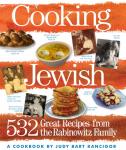
BUY COOKING JEWISH by clicking here now.
Rosh Hashanah
Pomegranates and apples for Rosh Hashanah
It has been revered since Biblical times as a symbol of fertility, good health and immortality. Celebrated by King Solomon in the Song of Songs, this tangy, many-seeded fruit with its crimson-hued, leathery shell was abundant in the Garden of Eden and is even thought by some scholars to have been the real “apple” that tempted Eve.
For the Jewish people, the pomegranate has special significance on Rosh Hashanah as one of the special foods that serve as auspicious omens for the year to come. “The pomegranate is a powerful visual and sensory omen that we eat during the holiday time to remind us of the way we’re supposed to act,” said Laura Frankel, author of “Jewish Cooking for All Seasons” (Wiley, $34.95) a joyful, accessible celebration of Jewish cooking throughout the year.
“The seeds of the pomegranate supposedly add up to 613, if you took the time to count,” she said,
Sally Bower's Apricot Pineapple Sauce
From Cooking Jewish: 532 Great Recipes from the Rabinowitz Family (Workman) by Judy Bart Kancigor
This recipe began as Aunt Sally's conserve, which is a thick spread of fruits, nuts, and sugar. Take away the nuts and you have preserves. Omit the nuts and cut the fruit into smaller pieces, and you have jam. Cook the jam for a shorter time and you have a glorious, fruity sauce with a punch of citrus, begging to be poured over ice cream or cake.
I had never made conserve (or jam or preserves, for that matter) before I tried Aunt Sally's recipe. It became such a favorite that I included it in my Rosh Hashanah cooking classes as a sauce for my mother's Nova Scotia Honey Orange Sponge Cake (above). Talk about easy! I would begin the class by asking for a show of hands: "How many of you have never made jam?" followed by "How many of you can open a can?"
1 pound dried apricots, halved (cut larger ones in thirds)
1 can (20 ounces) crushed pineapple, undrained
3 1/2 cups sugar
Grated zest of 1 orange
1 cup orange juice
1/2 teaspoon salt
3/4 cup broken walnuts (optional)
Kosher cuisine - simply divine!
The Canadian Jewish News
September 21, 2006
by Judy Bart Kancigor
With the first crisp breeze at summer’s close, I am filled with memories. Color War and the end of camp. The smell of newly sharpened pencils. New school clothes, and for the High Holidays: new hat, new gloves, new dresses for each service. Smells of roasting chicken and honey cake wafting downstairs from my grandparents’ apartment, where Mama Hinda busily prepares her erev Rosh Hashanah feast for the onslaught of Rabinowitzes that will soon fill those tiny rooms.
In choosing a menu for the holiday, some traditional dishes beg for inclusion. Would it be Rosh Hashanah without Mama Hinda’s majestic spiraled challah or Aunt Sally’s tzimmes? But I also like to mix it up with some new twists on old themes as I explore the new cookbooks of the season.
One that catches my eye is “Divine Kosher Cuisine” by Risé Routenberg and Barbara Wasser (Wimmer), the long-awaited, all-volunteer fund-raising project of Congregation Agudat Achim in Niskayuna, New York.
Routenberg and Wasser draw on their years of experience with As You Like It, the synagogue’s kosher catering service, which for decades has been a magnet in the area for all events Jewish, garnering national attention in 2003 when it won the Gold Solomon Schecter Award.
“When we were catering a bar or bat mitzvah or a wedding, invariably people would come in the kitchen and beg us for a recipe for this or that dish,” said Wasser. “We would tell them we were thrilled they loved the dish, but we were really sorry, and promised that when Risé and I retired, we would write a cookbook.”

